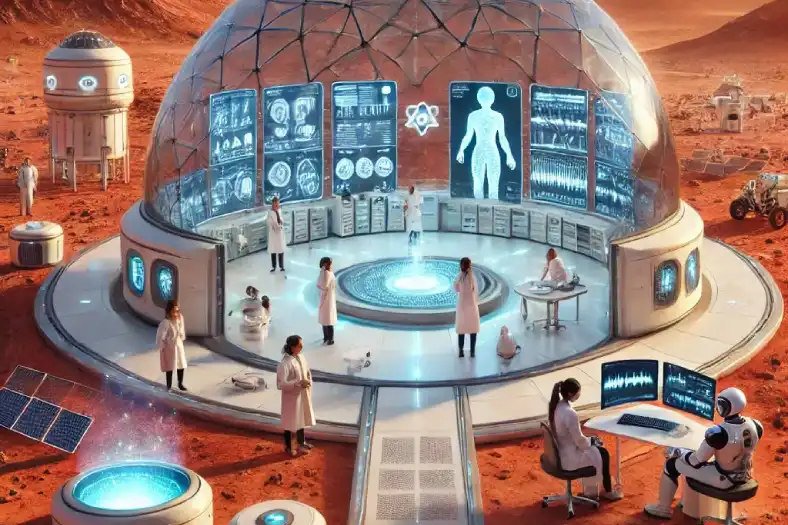As humanity embarks on one of the most ambitious journeys ever imagined—becoming an interplanetary species—the challenges of establishing a sustainable colony on Mars loom large. Elon Musk predicts that the first Starship missions to Mars will launch in just two years, with crewed missions following four years after. While these efforts will focus initially on survival and infrastructure, an equally critical piece of the puzzle will be the healthcare of those brave enough to settle on another planet. In this context, artificial intelligence (AI) will be not only a critical enabler but a transformative force for healthcare in space.
Healthcare in a New Frontier
Providing healthcare on Earth is already a complex, resource-intensive task. When considering a Mars colony—isolated by millions of miles from the resources of Earth—the challenges grow exponentially. Long-distance communication delays, limited access to specialists, and the harsh Martian environment will all test the limits of modern healthcare systems. However, with AI at the core of space medicine, we can build a robust, autonomous healthcare infrastructure capable of addressing these unprecedented challenges.
1. AI as the Primary Diagnostic Tool
On Mars, medical professionals will be few and far between, and emergency situations could arise at any moment. AI-powered diagnostic systems will serve as the first line of defense, analyzing medical data from wearable sensors, scanning for early signs of illness, and flagging potential health risks long before symptoms become apparent. AI platforms will be trained to understand both the human body and the unique physiological changes that occur in space, such as muscle atrophy, radiation exposure, and changes in bone density.
With real-time, AI-driven diagnostics, colonists will have a virtual doctor at their side, able to provide immediate, evidence-based recommendations for care.
2. Autonomous Surgical Systems
Emergency surgery in space will be a reality that a Mars colony must be prepared for. AI-guided robotic surgery systems will be crucial for handling complex procedures in environments where human surgeons may be unavailable or incapacitated. These systems, powered by advanced machine learning algorithms, will be able to autonomously perform life-saving surgeries with precision, even in the harsh conditions of space.
AI will also play a vital role in post-surgical care, utilizing predictive analytics to monitor patients’ recovery and adjust treatment plans accordingly.
3. Personalized Medicine Powered by AI
Mars settlers will be exposed to different environmental factors—lower gravity, increased radiation, and a new diet—all of which will require highly personalized healthcare. AI can analyze each individual’s genome, microbiome, and ongoing physiological changes to deliver highly personalized treatment plans that adapt to the Martian environment. This level of precision medicine will be essential to maintain the health and longevity of the Martian population.
Moreover, AI-driven platforms will continuously analyze health data to prevent diseases, predict health issues before they arise, and manage chronic conditions with tailored interventions.
4. Mental Health Support Through AI
Living on Mars will come with unprecedented psychological challenges, including isolation, confinement, and the potential for existential stress. AI-powered mental health solutions—like virtual counselors and adaptive cognitive behavioral therapy (CBT) programs—will provide round-the-clock mental health support. These systems will use natural language processing (NLP) to engage with colonists, helping them manage stress, anxiety, and depression, while continuously learning to improve their effectiveness.
Furthermore, AI can help monitor mental health patterns, using behavioral analytics to detect early signs of distress and provide proactive interventions before more serious issues arise.
5. Remote and Autonomous Research
Mars will be a new frontier not only for life but also for research. AI will allow researchers to autonomously study how the Martian environment affects human physiology, medicine, and health. Autonomous AI-driven laboratories on Mars could conduct experiments, analyze data, and generate new medical insights far beyond what’s currently possible on Earth. These labs will be essential for developing new treatments, materials, and processes adapted to life on Mars.
6. AI for Medical Education and Continuous Training
With only a limited number of healthcare professionals on Mars, AI will serve as a continuous education platform. By simulating medical scenarios, AI-powered systems will provide real-time, immersive training to healthcare professionals and even non-experts who may need to assist in medical emergencies. These simulations will help bridge the gap in expertise by making complex medical knowledge more accessible, particularly in an environment where traditional education channels are unavailable.
7. AI-Enabled Supply Chain Management
Managing medical supplies on Mars will be a logistical challenge. AI will optimize medical inventory, ensuring that essential medications, tools, and equipment are available when needed, despite the vast distance from Earth. With predictive analytics, AI can anticipate medical needs based on individual health data and environmental conditions, allowing for more effective management of limited resources.
The Role of AI in Expanding the Lifespan of Humanity
Ultimately, AI will not only enable healthcare on Mars but also play a pivotal role in ensuring the survival and thriving of humanity as a multi-planetary species. Just as establishing a sustainable city on Mars will increase the probable lifespan of consciousness, as Musk predicts, AI-enabled healthcare will increase the probable lifespan of each individual, improving quality of life in an inhospitable environment.
By revolutionizing healthcare delivery, AI will transform medicine into a system capable of evolving with humanity, ensuring that wherever we go—whether it’s Mars or beyond—we take the future of health with us.
As we prepare for this interplanetary leap, AI will be the driving force that makes healthcare more accessible, adaptive, and resilient. It is no longer a question of if AI will enable our health in space, but how soon we can harness its power to extend human life beyond Earth.



0 Comments